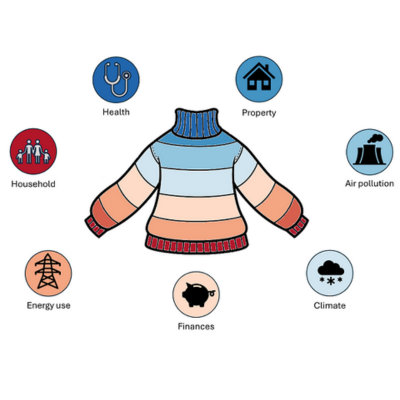Building communities that support active travel is now a major focus for regional authorities throughout the UK. The Scottish Government will be allocating as much as 10% of its transport budget to active travel by 2024/25, putting Scotland on a par with eco-friendly transport leaders like Amsterdam.
UrbanTide attended a number of transport events this summer, and we were delighted to find sustainable transport was a main priority at every event. It also confirmed just how invaluable our transport data product, uMove, will be to supporting the drive towards sustainable travel in the UK.
One of the events we attended was the Cycle County Active County conference hosted by Oxfordshire County Council. This event shed light on the current challenges local authorities are facing when developing active travel programmes and proposed solutions.
Here’s an overview of the main challenges that were highlighted at the event and how uMove can support local authorities to overcome them.

Current challenges with active travel in the UK
1. Not all travel data is accessible
While there are vast amounts of travel data out there, it’s often siloed and locked away for specific projects. In order to gain a true understanding of how people move in our communities, we need open access to both new and historic data that has been shut away from previous use cases.
Opening up all national transport data is imperative to building the evidence base used for decision-making in active travel plans. Active Travel England has officially recognised that open data-sharing is imperative if local authorities are to take a more strategic and value-for-money approach to local decision-making for travel options.
2. Transport data collection isn’t standardised
As it stands, a lot of the transport data we currently collect in the UK is unusable because it isn’t standardised. Transport data is collected in a whole variety of different ways, stored in different places and presented in unstandardised formats.
This lack of consistency in data collection, analysis and interpretation makes it difficult to draw any meaningful conclusions or reliable insights that can be used for funding applications and overall decision-making.
High-quality, consistent data is required to improve decision-making in planning, evaluation and monitoring of active travel programmes. Our uMove product is the perfect solution to this, the platform automatically validates, converts and standardises all travel data it ingests from any data source.
3. Not enough quality travel data available
Transport bodies and organisations have made it clear that they need access to more real-time data, and better quality travel data, in order to understand current trends and inform future planning. Reliable data is crucial to baseline current behaviours and discover the wants and needs of the populations they serve.
Attendees of the Cycle County event spoke about the need for more walking data and the integration of walking into more initiatives, such as Local Cycling and Walking Infrastructure Plans (LCWIPs).
uMove provides quality real-time data as traffic data is automatically updated by live travel data feeds. This means uMove users can visualise changes as they happen and use data insights to evaluate and optimise ongoing infrastructure strategy.
4. Unable to create a reliable evidence base
To create a solid evidence base for active travel, local authorities need access to good-quality data. But they often struggle to find data they can trust to provide any reliable conclusions.
A more comprehensive evidence base that incorporates data from multiple sources and use cases is needed to boost trust in conclusions and resulting decisions.
Through uMove, authorities can transform traffic data into usable insights by generating bespoke reports. These data visualisations can be used as an evidence base to support funding applications, optimise sustainable transport planning and promote behavioural change.

Potential solutions to active travel challenges
Understand what communities want & need
The first step to successful active travel programmes is understanding what people in the community actually want and need.
In order to do this, we need to identify trends and baseline current behaviour, as well as engage with communities to understand what initiatives are going to bring the most positive impacts.
uMove can support this initiative by integrating both historic and current real-time travel data and applying machine learning to predict future travel patterns.
Promote behavioural change
Behavioural change is central to new transport initiatives, as targets set out for Net Zero and sustainability require people to choose alternative, more sustainable transport modes and reduce car dependency.
Chris Boardman from active travel England identified ‘loss aversion’ as the biggest challenge, suggesting that a ‘fear of missing out’ needs to be felt in order for the public to embrace sustainable modes of travel. In order to generate interest in these initiatives, people need to observe others using alternative modes of travel so they can follow suit.
Not only will this help towards creating a culture that influences behavioural change, but it also creates a larger pool of data so authorities and transport bodies can see what’s working and what’s not, so initiatives can continuously be improved.
Better communication and collaboration
Sharing information and data across organisations can help to build the evidence and baseline data used for decision-making. Data visualisations also function as proof of which initiatives are working and which aren’t.
Monitoring data and making continuous improvements ensures initiatives are always making progress towards sustainable transport goals. Speakers at Cycle County highlighted that data evidence is required to demonstrate the impact of active travel on health and the environment. We need to start evaluating and modelling the benefits of active travel initiatives on health, the environment and the economy.
Through uMove, authorities are able to easily integrate travel data with other cross-sector datasets – like health data and environmental data – to create a reliable, holistic view of how active travel impacts communities and their residents.
uMove data platform
uMove is an innovative AI and transport data insights platform that maps, tracks and predicts travel patterns across the UK.
By creating a single source of truth for all transport data in the UK, uMove can provide an accurate, real-time understanding of how people are using our streets today. uMove’s advanced AI enables towns and cities to predict future travel patterns so they can plan for a more sustainable tomorrow.
To find out more about how UrbanTide’s uMove data platform can help organisations overcome the challenges associated with embedding active travel into local communities, read more about uMove here or request a demo with a member of our team.






